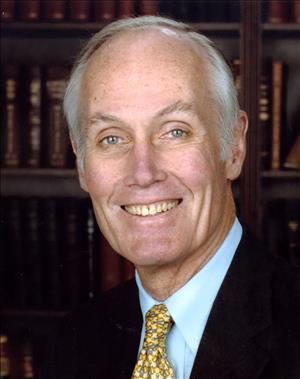On November 8, 1994, Washington voters re-elect Republican Slade Gorton (b. 1928) to his seat in the U.S. Senate. As part of a nationwide Republican landslide, five of the state's incumbent Democratic members of Congress are ousted by Republican challengers, including Spokane Congressman Tom Foley (1929-2013), the Speaker of the U.S. House of Representatives. State voters also approve ballot measures prohibiting anyone not a dentist from preparing dentures and directing that tobacco and liquor taxes be used to fund anti-drug and anti-violence programs.
Gorton retained his seat over Democratic challenger Ron Sims (b. 1948), a member of the King County Council, with 947,821 votes to 752,352 for Sims. A Seattle Times poll reported that voters were less influenced by issues than they were by the personalities of the candidates. According to the poll, Gorton won votes based on his integrity, his politics, and his experience, while people tended to vote for Sims because he wasn't Gorton.
Speaker Ousted
Republicans, who had won only one of Washington's nine seats in the U.S. House of Representatives two years earlier, took seven of them in 1994, sweeping away five Democratic House incumbents, including House Speaker Tom Foley, and winning an open seat previously held by a retiring Democrat.
In Eastern Washington's Fifth Congressional District, political newcomer George Nethercutt (b. 1944) narrowly defeated Foley, the longest-serving U.S. Representative from Washington. First elected to the House in the Democratic landslide of 1964, Speaker Foley became the most prominent casualty of the 1994 national Republican landslide, which saw the GOP regain control of the House for the first time in 40 years. Even if Foley had won his own election, the Republican House majority meant that Georgia Republican Newt Gingrich would have replaced him as House Speaker. Foley became the first House Speaker to be defeated for re-election in 134 years. The last Speaker who lost a re-election campaign was William Pennington, a one-term representative from New Jersey, who was elected in 1858 as a member of the nearly defunct Whig Party, then defeated in the Republican victory of 1860.
Pledge Rescinded
Nethercutt, a Spokane attorney, was a political unknown when he entered the race against Foley. He benefited from a strong anti-Congress and anti-incumbent mood across the state and country, while Foley seemed to personify the institution that voters disliked and distrusted. Foley angered some constituents by joining a lawsuit to overturn voter-approved term limits. Nethercutt made term limits and Foley's length of service an issue. He pledged that he would serve only three terms (six years), and campaigned on the slogan "After 30 years, it's time for new leadership" (Weekly, 22). Nethercutt was strongly supported by the powerful national term-limits movement led by U.S. Term Limits, and by popular Spokane radio-show host Richard Clear, a conservative term-limits advocate.
Five years later in 1999, Nethercutt incensed term limits supporters when he announced that despite his pledge, he would seek a fourth term in 2000. Clear opposed Nethercutt in the Republican primary, and U.S. Term Limits spent heavily in an effort to defeat him. However, Nethercutt beat Clear and easily bested Democrat Tom Keefe in the general election. Nethercutt was elected to a fifth term in 2002. He gave up the House seat in 2004 when he ran unsuccessfully for the U.S. Senate seat held by Democrat Patty Murray (b. 1950).
Congressional Turnover
Four other Democratic House members from Washington joined Foley in losing their seats in 1994. In the Third District in southwest Washington, three-term Democratic incumbent Jolene Unsoeld (b. 1931) was defeated by Republican state legislator Linda Smith (b. 1950). The other three ousted representatives had first been elected only two years earlier. In 1992 Maria Cantwell (b. 1958) won the First District in northern King County, Jay Inslee (b. 1951) narrowly defeated Doc Hastings (b. 1941) in the Fourth District of Central Washington, and Mike Kreidler (b. 1943) became the first U.S. Representative from the state's newly created Ninth District that stretched from Thurston County to the fast-growing suburbs of south King County. In 1994, Rick White (b. 1953) defeated Cantwell in the First District; Hastings bested Inslee in a Fourth District rematch; and Randy Tate (b. 1965) ousted Kreidler in the Ninth District.
The 1994 losses proved to be only temporary setbacks for the three defeated first-term representatives, all of whom went on to greater political success. Inslee moved to the First District and in 1998 defeated White to win the seat that White had taken from Cantwell four years earlier; in 2012 Inslee was elected governor of Washington. In 2000, Cantwell challenged Gorton for the U.S. Senate seat, defeating him in a very close vote; she was re-elected to the Senate in 2006 and 2012. Kreidler was elected state Insurance Commissioner in 2000, and re-elected three times as of 2012.
One other House seat from Washington also switched from Democrat to Republican in the 1994 election. Democrat Al Swift (b. 1935), who had represented the Second District for eight terms, retired, and Republican Jack Metcalf (1927-2007) defeated Democrat Harriet A. Spanel in the race to succeed him.
Three incumbent representatives won re-election. Two Democrats, Norm Dicks in the Sixth District on the Olympic Peninsula and Jim McDermott (b. 1936) in the Seventh District representing Seattle, retained their seats by comfortable margins. Jennifer Dunn, who had spent the last two years as the state's only Republican representative, retained the Eighth District seat representing King County's East Side by an even larger margin.
Other Races
The Republican sweep was not confined to federal offices. In the state legislature, Republicans took control of the House and yielded to Democratic control of the Senate by just one seat.
State voters approved taxes on liquor, tobacco, and soda-pop syrup to support crime-fighting programs. Dentists were overwhelmingly assured that they would be the only ones to make dentures. Seattle voters approved a school bond issue, but declined to approve funds for police facilities or libraries.

